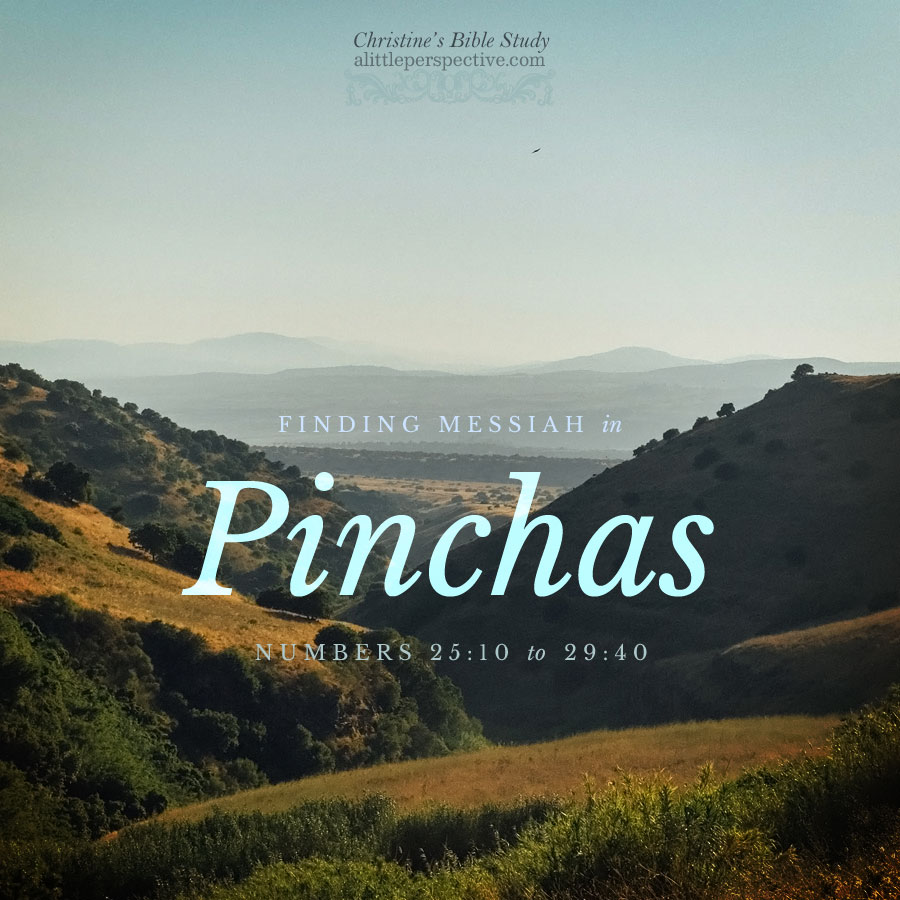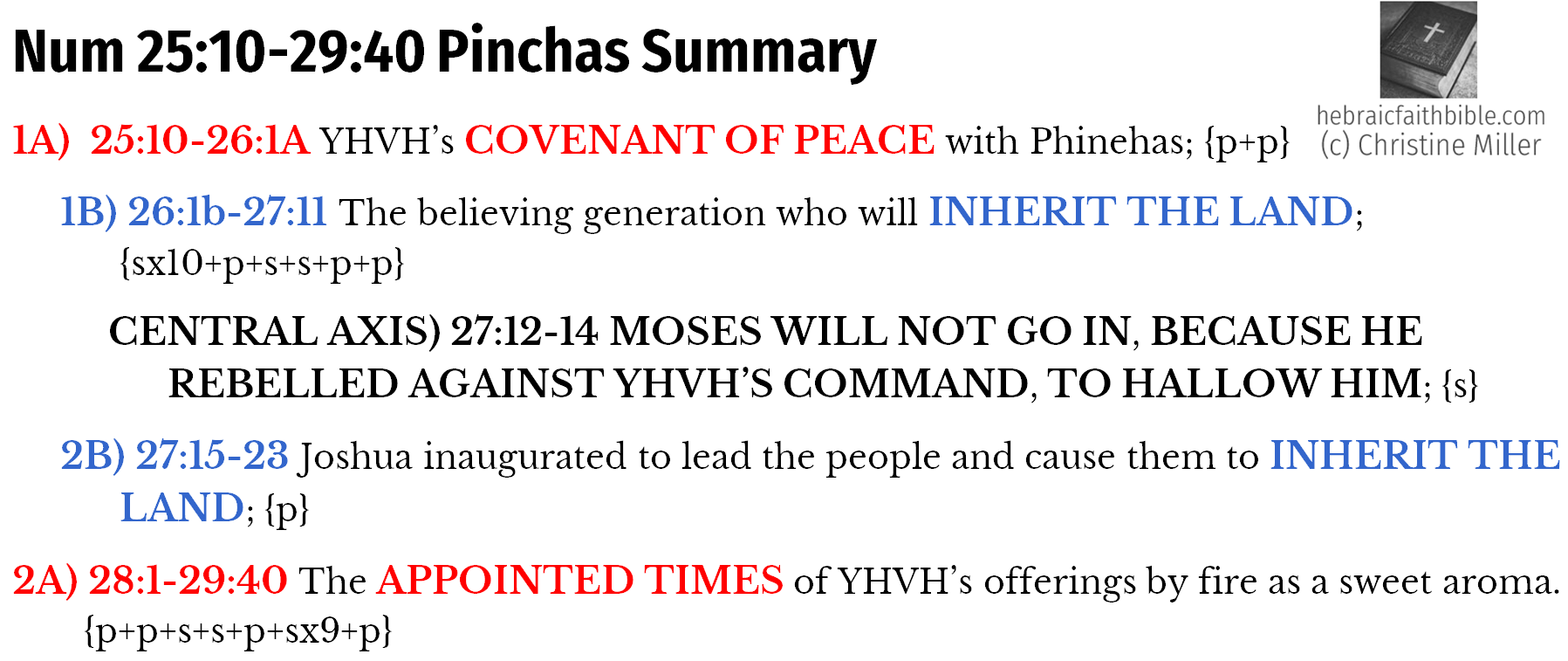Num 25:10-26:51
Hebrew paragraph divisions:
25:10-15 {p} YHVH’s covenant of peace with Phinehas son of Eleazar son of Aaron
25:16-26:1a {p} (and it came to pass after the plague. p) Harass the Midianites and attack them
26:1b-11 {s} The number of Reuben was 43,730
26:12-14 {s} The number of Simeon was 22,200
26:15-18 {s} The number of Gad was 40,500
26:19-22 {s} The number of Judah was 76,500
26:23-25 {s} The number of Issachar was 64,300
26:26-27 {s} The number of Zebulun was 60,500
26:28-34 {s} The number of Joseph: of Manasseh was 52,700,
26:35-37 {s} The number of Joseph: of Ephraim was 32,500
26:38-41 {s} The number of Benjamin was 45,600
26:42-43 {s} The number of Dan was 64,400
26:44-47 {s} The number of Asher was 53,400
26:48-51 {p} The number of Naphtali was 45,400, total = 601,730
The strong theme of this section of Scripture is,
26:1b-51 {sx11+p} Strong theme: The number of the believing generation
If we peek ahead to the next strong theme, we find:
26:52-56 {s} To this number shall the land be divided among them
26:57-65 {s} Levites = 23,000/ not a man was numbered previously
27:1-5 {p} The case of the daughters of Zelophehad
That is,
26:52-27:5 {s+s+p} Strong theme: Those who will inherit the land
The strong themes are proclaiming the Gospel of grace!
26:1b-51 {sx11+p} Strong Theme: The number of the believing generation
26:52-27:5 {s+s+p} Strong Theme: Those who will inherit the land
That is,
26:1b-27:5 {sx11+p+s+s+p} Strong theme: Belief inherits the promise
Torah is proclaiming by foreshadow of the promise of eternal life in Messiah Yeshua.
Num 26:52-27:23
Hebrew paragraph divisions:
26:52-56 {s} To this number shall the land be divided among them
26:57-65 {s} Levites = 23,000/ not a man was numbered previously
27:1-5 {p} The case of the daughters of Zelophehad
27:6-11 {p} If a man die without a son, his inheritance shall pass to his daughter
27:12-14 {s} Moses to go up to Mount Abarim to see the land before his death
27:15-23 {p} Joshua inaugurated to lead the people in
The next strong theme is,
27:12-23 {s+p} Strong theme: Joshua, not Moses, will lead the people in and cause them to inherit the land
In this strong theme, YHVH repeats that Moses will not lead the people in to the Promised Land because he rebelled against Him and did not hallow Him in the eyes of the congregation at the waters of Meribah.
“And when you have seen it, you also shall be gathered unto your people, as Aaron your brother was gathered. For you rebelled against My commandment, in the desert of Zin, during the strife of the congregation, to sanctify Me at the water before their eyes: that is the water of Meribah in Kadesh in the wilderness of Zin.” Num 27:13-14
Unbelief cannot inherit the land, and rebellion is a fruit of unbelief. So Joshua is inaugurated shepherd to lead the people in. This is also prophetic, for no one can inherit the promise by obedience to the Law, that is, by obedience to Moses by type. But only as Yeshua—“Joshua” is the anglicized form of the Hebrew name, “Yeshua”—is Shepherd over them, they can inherit the promise.
Yeshua! His work on the cross to cleanse us from our sins will cause God’s people to inherit the promise, not Moses; that is, not our own works of obedience to the Law.
Therefore by the deeds of the Law no flesh shall be justified in His sight, for by the Law is the knowledge of sin. Rom 3:20
This is why Paul stood so strongly against those in his own day who misunderstood, saying that justification—right-standing before God—depended on obedience. Paul did not preach dis-obedience to the Law! But he taught that salvation does not depend upon our own works, but upon Yeshua’s work on the cross, which cannot be added to or taken away from. Our acts of obedience proceed now from the new nature, and serves as a second witness, besides the confession of our mouths, that we have indeed become children of God by grace through faith. Let every fact be confirmed upon the testimony of two witnesses, Amen?
Num 28:1-29:40
The Hebrew paragraph divisions:
28:1-8 {p} Daily offerings, morning and evening
28:9-10 {p} Offerings for the Sabbath
28:11-15 {s} Offerings for the new moon
28:16-25 {s} Offerings for Passover and Unleavened Bread
28:26-31 {p} Offerings for the Feast of Weeks
29:1-6 {s} Offerings for the Feast of Trumpets
29:7-11 {s} Offerings for the Day of Atonement
29:12-16 {s} Offerings for the 1st day of Tabernacles (13)
29:17-19 {s} Offerings for the 2nd day of Tabernacles (12)
29:20-22 {s} Offerings for the 3rd day of Tabernacles (11)
29:23-25 {s} Offerings for the 4th day of Tabernacles (10)
29:26-28 {s} Offerings for the 5th day of Tabernacles (9)
29:29-31 {s} Offerings for the 6th day of Tabernacles (8)
29:32-34 {s} Offerings for the 7th day of Tabernacles (7) = 70
29:35-40 {p} Offerings for the 8th day following Tabernacles (1)
These paragraphs resolve into the following strong themes:
28:1-10 {p+p} Strong theme: Daily and weekly (Sabbath) offerings
28:11-31 {s+s+p} Strong theme: Offerings for the new moon and spring feast days
29:1-40 {sx9+p} Strong theme: Offerings for the fall feast days
Messiah Yeshua fulfilled the spring feasts in His first coming, and Sabbath rest prophesies of the millennium of rest we will enjoy upon His return. Now our daily offering and feast day offerings is of offering ourselves as a living sacrifice in worship of our great Creator and Redeemer.
I beseech you therefore, brethren, by the mercies of God, that you present your bodies a living sacrifice, holy, acceptable unto God, which is your reasonable service. Rom 12:1
It is the only reasonable worship in response to all Messiah Yeshua has done for us.
The strong themes divide the instruction for the spring and fall feast days. Scripture separates the feast days into three spring celebrations and three fall celebrations. Three … a sign of Messiah.
Please note that the priest operating in his priesthood, offers seventy bulls during the week of Tabernacles, and one bull on the eighth day following. By common theme, we realize that seventy, in Scripture, refers to the seventy nations which rebelled against YHVH at the Tower of Babel rebellion (Gen 10 and 11). Just as the High Priest serves as priest before YHVH for Israel, Israel is serving as the priesthood nation before YHVH for the seventy nations which have fallen away. Tuck this tidbit on the back burner …
Looking at the chiastic structure for the entire Torah portion Pinchas:
Phinehas as a type of Messiah reveals that Messiah, operating in His priesthood, establishes a covenant of peace for Israel which extends to the seventy nations that rebelled at Babel. Messiah takes up His priesthood that no more wrath come upon Israel, or the nations. So the angels sang at Messiah’s birth,
“Glory to God in the highest,
And on earth peace, good will toward men!” Luk 2:14
Next, we have that the believing generation enters its promise under Joshua, not Moses. Those who do works in unbelief or apart from faith, will not inherit salvation on their merit, but those who believe will inherit salvation.
Do we then nullify the Law through faith? God forbid! Rather, we establish the Law. Rom 3:31
That is, obedience flows from the saved—the New Testament calls it sanctification—but it is not the means of being saved—the New Testament calls it justification.
The theme of Pinchas is that the everlasting priesthood of Yeshua, Phinehas by type, establishes the covenant of peace between God and Israel, even to all seventy nations, so that Yeshua, Joshua by type, leads those who believe to inherit salvation by grace through faith, but unbelief, or works, will not inherit salvation.
NUMBERS 25:10-29:40 ANNUAL PINCHAS “PHINEHAS” OUTLINE | NUMBERS in CHIASTIC STRUCTURE
FINDING MESSIAH in TORAH: A MESSIANIC DISCOVERY THROUGH the TORAH PORTIONS
THE LAW of LOVE: THE GOSPEL of GRACE REVEALED in the COMMANDMENTS OF GOD


















Leave a Reply